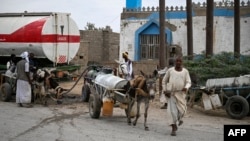Filippo Grandi, the United Nations high commissioner for refugees, on Wednesday urged an end to the war in Sudan, where hunger and violence have driven millions from their homes.
“They are fleeing horrible violence, very severe violations of human rights,” Grandi told VOA in an interview from Juba, South Sudan, after field visits to Renk in South Sudan and across the border in Kosti, a city in Sudan’s White Nile state.
Thursday is World Refugee Day, and Grandi hopes to put this neglected crisis in the global spotlight.
The United Nations has warned that 5 million Sudanese are on the brink of famine. Millions more are severely food insecure. Harvests have been lost, markets looted and burned, and humanitarians obstructed from delivering adequate aid.
“But increasingly they are also fleeing deprivation — and in particular food insecurity, and in some cases, hunger,” Grandi said. “So you have a multiplication of factors that are all generated clearly by this insane war that doesn’t seem to end.”
The United Nations says the 14-month-long war between rival generals has internally displaced more than 6 million people on top of the nearly 4 million who were displaced before the current conflict. Another 2 million have fled to neighboring countries, including Chad, South Sudan and Ethiopia.
“Let’s not forget that these people are coming, like here in South Sudan, to countries that are already very fragile — they have huge challenges of their own in terms of security, political fragility, governance, economic problems and so forth,” Grandi said, praising them for keeping their borders open and offering shelter.
A U.N. panel of experts said earlier this year that external actors are fueling Sudan’s conflict by providing the warring generals with weapons and ammunition.
“My appeal is really to everybody who has any influence on the parties in this conflict: Push them not towards the battlefield, but to the negotiating table,” Grandi said. “This is what is most needed: a cease-fire first and then the possibility that there is a political solution. Without that, I am afraid we will see more refugees and more suffering.”
The head of the paramilitary Rapid Support Forces has been locked in an armed power struggle with the head of the Sudanese Armed Forces for the past 14 months. The fighting has spread from Sudan’s capital, Khartoum, to other parts of the country, leaving death, destruction and a humanitarian catastrophe in its wake.



